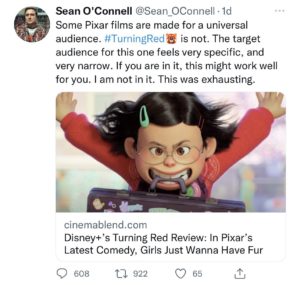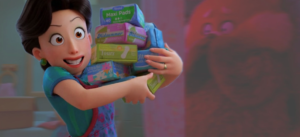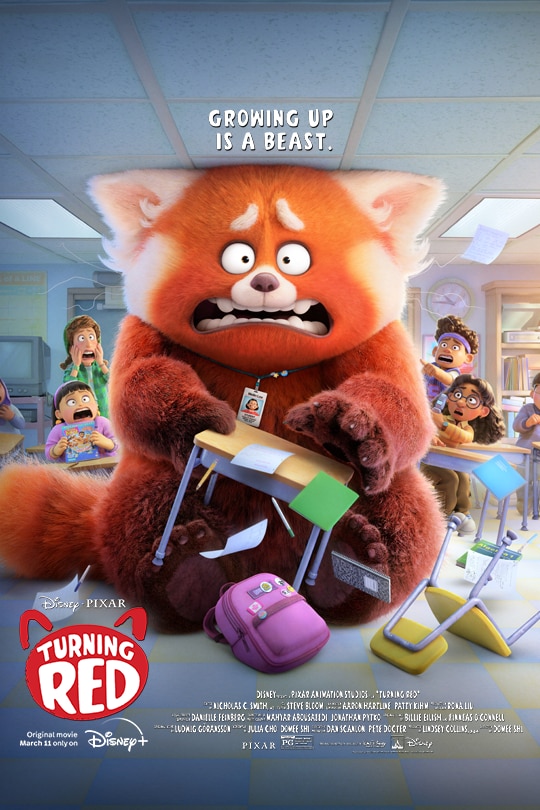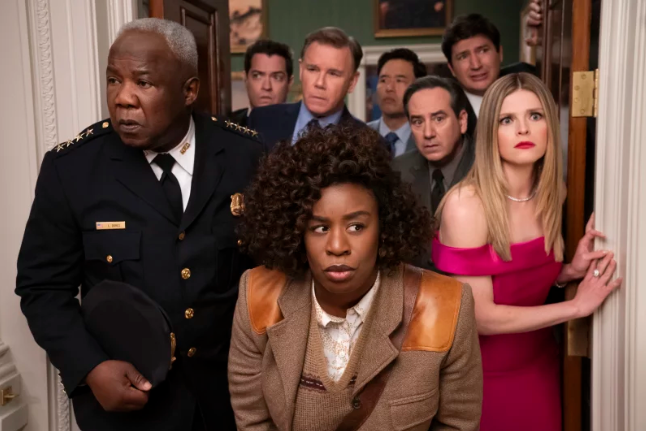Dealing with transforming into a red panda on top of the struggles of one’s middle school years is surely unusual, but for Meilin Lee (Rosalie Chiang) in Pixar’s latest film, “Turning Red,” it proves as a turning point in her and her family’s life, and acts as a catalyst for new turning points in our own.
The 2022 film demonstrates a breakthrough and monumental change for the main character and reflects the same ideas of change in our own lives. “Turning Red” was Pixar’s first film led by an Asian team and was directed by Domee Shi, the first woman to direct a Pixar short (Bao), which won an Oscar, making history yet again, as it was the first time a woman was awarded in the Best Animated Short Film category.
Most things that stray from familiarity and comfort evoke criticism, and Pixar is no exception. With their novel idea to focus on Asian Canadians and the hardships of growing up, comments complaining about the relatability (or apparent “lack of”) of the movie and the way non-Asians “couldn’t connect to the marginal film” were rampant.

Sean O’Connell, CinemaBlend’s managing director, claimed in a deleted review that the movie was “limiting” and something that risked “alienating” viewers; it was followed by the assumption that the movie was made specifically for Domee Shi’s friends and family.
His common assumption that the movie reaches only a small audience can be credited to a long history of white-centered media, society, culture, and patterns in our world, and more specifically, Pixar as a whole. More than half of the world’s population is of Asian descent, so clearly it’s relatable to many, and the lack of Asian representation in history mixed with these “critiques” makes me wonder: Does he think that people of color connect and relate to every single movie, Disney and Pixar included, that ignores POC experiences and cultures in favor of ones familiar to him?
“Turning Red” wasn’t my favorite Pixar movie when looking solely at the storyline, writing, or acting, not by far, especially in comparison to some classics like “Cars” and “The Incredibles.” However, the significance and message of the film provided me with a different sense of appreciation and respect. Growing up as an Asian-American, having “Mulan” as the only movie that featured a character remotely similar to me growing up impacted my own perception of myself more than I was able to recognize as a child. Even with Mulan, it was about as relatable to my life growing up in America as “Up” was, as it only portrayed a small portion of myself. Having a Disney Pixar movie centered around a Canadian girl obsessed with boybands whose family speaks Cantonese finally represents hundreds of thousands of children that never see themselves in mainstream shows, movies, and books.
However, comments have also been made about “Turning Red’s” exaggeration of Asian culture and experiences, and I myself even criticized the movie for this upon my first watch. The extremity of Ming (Sandra Oh), Mei’s mom, at some points felt like it was pushing harmful Asian stereotypes that we’ve been made fun of for years.
Towards the beginning of the film, when Ming is convinced that Mei got her period (and is unaware of the red panda transformation), she hovers outside of Mei’s classroom. She yells that Mei forgot to bring pads, shouting and fighting a security guard in an attempt to reach her daughter amongst the rest of the students who are pointing and laughing. Mei is, of course, mortified and runs away, leading to her mom’s discovery of the panda.
I felt that this scene was over-the-top embarrassing, and painted Asian moms in an unnecessarily bad light. However, I did learn later that this was based on a scenario that actually happened to Director Domee Shi, so my initial perception of exaggeration was proven wrong (but even though it actually happened, it doesn’t change the fact that it was negatively portraying Ming). Although, regardless of this one real-life situation, there are multiple other instances, such as Ming storming into Daisy Mart to show Mei’s “crush” embarrassing images that her daughter drew, not giving her a chance to explain. I think that the protectiveness is accurate, but the problem was with the extremely negative way it showed Ming.
Upon closer analysis and thought, however, I realize that the lack of movies about Asian Americans (that weren’t solely focused on their struggles and racism) was really the problem. “Turning Red” made an accurate depiction of many Chinese families, although the lack of portrayal of the other Asian American experiences highlights and insinuates that all Asian moms are as protective and strict as Ming. While many Asian moms are exactly like this, it’s definitely not all, and the lack of representation of all types of families makes it seem like “Turning Red” is hurting the community and playing into stereotypes.
I think the real issue lies not within the film, but with the lack of Asian protagonists and storylines in the media most people consume, which can only be fixed with time. The only aid is to create more stories of all Asians, not just the extreme depictions of generational trauma from first and second-generation Asian immigrant families. We need more representation within representation; however, “Turning Red ” was undoubtedly a catalyst for more.
While “Turning Red” in my eyes was mostly used as a step closer towards more and better Asian representation in media, it also contributed major firsts in normalizing the awkwardness of getting older and growing up, something praised by many.

When Mei first discovers her panda form she runs to the bathroom crying, which alerts Ming into asking if “the red peony bloomed,” an obvious euphemism for menstruation. She doesn’t hesitate to walk in with an armful of pads, a hot water bottle, and much more that is often not talked about (seriously) in kids’ movies.
As expected, following the pattern of criticism from non-Asians was the criticism from those who didn’t or won’t experience menstruation or growing up in a female body. Even some who have grown up like Mei think that it’s inappropriate to normalize a natural occurrence that’s often feared at a young age. Misinformation that comes from the lack of discussion and education on the topic makes growing up even harder and intimidating, but “Turning Red” is opening the eyes and desensitizing young (and even old) minds to topics that should have been normalized from the start. The movie executed it well and in a way beneficial for everyone, not just those about to experience it for the first time.
“Turning Red” unravels a lot of damage from racism, sexism, and underrepresentation in a humorous and light way that I believe all can enjoy, whether you view it surface-level or dig deep into its messages. The movie had its cringe moments and extravagant animation and acting, but is there a Pixar movie that doesn’t?
“Turning Red” is an important film that realistically and beautifully portrays friendship, family relationships and mending, growing up, and much much more.












